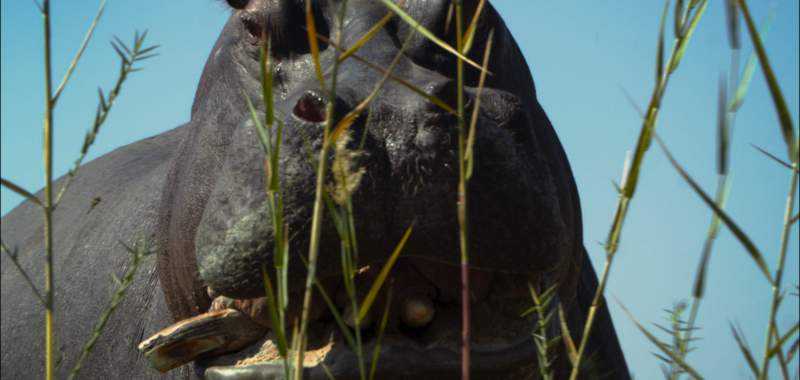Pepe is hard to put into words. The enigmatic film exemplifies brilliant filmmaking yet fumbles in its esotericism. In the broadest terms, Pepe is a film about a real-life Colombian hippopotamus’s final thoughts as he gains the ability to recount his entire life. It is also about language, colonialism, gender politics, folk mysticism, existentialism, and sometimes hippo biology.
As the story goes, Pablo Escobar imported various exotic animals to his Hacienda Nápoles in the 1980s. When he was killed, four leftover hippos began to migrate and populate along the Magdalena River. By 2023, the hippo population had grown to roughly 169. Pepe follows this narrative, starting with the titular hippo’s parents in 1979 Südwestafrika (now Namibia) and ending with Pepe’s murder in 2009. “Murder” is a keyword as Pepe prioritizes ascribing agency to the hippo to describe his emotional journey.
When Pepe is exiled from his herd (alpha male hippos exile any males born), he narrates to the audience, “This is how I realized that a hierarchy exists — first with the arrival of Pablito [Escobar]. And then, when I left the herd my story could only be told when it became their story.” Director Nelson Carlo De Los Santos Arias uses Pepe’s voice to examine language in a postcolonial framework. Pepe, a hippo, speaks in German, Spanish, and Afrikaans while wondering how he is able to speak as well as understand that these sounds aren’t normal for a hippo. He realizes he’s a subject in a story he can’t even tell because in actuality he is a hippo (reminiscent of how Paul Gilroy’s 1993 book The Black Atlantic connects the transatlantic slave trade to the double-consciousness within Black Americans who reconcile their identities daily).

At the 2024 Berlinale press conference for Pepe, De Los Santos Arias was asked how he conceptualized his film. He answered that the current situation regarding the Colombian government and hippos doesn’t interest him: “What I was interested in was all this symbolism.” The director is in a precarious position when the current sociopolitical reality of Colombia’s hippos isn’t explicitly acknowledged, but this symbolism is made quite apparent when looking at the film’s formal elements.
Breathtaking cinematography and sound design shape the film: omniscient overhead shots of the Magdalena River; a barrage of solider’s bullets transforming into an eclectic drum loop. Yet a critical problem arises where the center of subjectivity shifts from Pepe to a couple, played by Jorge Puntillón García and Sor María Ríos, and their human melodrama. Candelario, a fisherman, becomes obsessed with a (then) unknown animal in the river and confides in his wife, Betania, who accuses him of cheating and using the river beast as an excuse to avoid confrontation. Within Afrikaans folklore, hippo attacks indicate that a spouse is being unfaithful. But if a film is so determined to let a philosophizing hippo speak, then should it not remain steadfast on that unique motif? To decenter Pepe’s articulated revelations halts the imagination within the film’s magical realism. Stories about animal subjectivity can unveil many otherwise hidden absurdities of our society.

Pepe is unlike most films released in recent memory, notably as it comes from Dominican filmmakers working to combat cultural exclusion from international conversations. De Los Santos Arias is a filmmaker I admire for his political intentionality and poetic sensibility; he explores what it means to be a Caribbean filmmaker in an industry that hardly recognizes his region. During his last moments, Pepe says, “What’s authentic and false, what’s serious and playful, the real deed and the shadow of my life. A baroque mixture, excessive, opaque, heterogeneous … difficult words that I will never understand how they got here.”
Pepe is a hippo born from Southwest African parents who were forcibly moved from their native lands to Columbia. Suffocated with a language and culture that was not their own, these hippos adapted to create a sustainable habitat. However, as the hippo population grew, the ecological risk and danger to humans made authorities begin to hunt this “invasive species.” Pepe’s martyrdom (similar to that of Harambe in 2016) drew tons of international attention to animal rights awareness and conservation. Hippos are considered a vulnerable species with a global population of roughly 130,000.
It is disarming how captivatingly beautiful hippos are in Pepe, but the truth of the matter is that humans are often too ensconced in their own narratives to notice.

Pepe is currently available to stream on Mubi.

